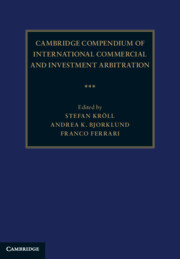Book contents
- Cambridge Compendium of International Commercial and Investment Arbitration
- Cambridge Compendium of International Commercial and Investment Arbitration
- Copyright page
- Contents
- Figures
- Tables
- Contributors
- Preface
- Part I Foundations
- Part II Public Law Questions Relating to Arbitration
- Part III Stakeholders in Arbitration
- Part IV Applicable Law
- Part V Jurisdiction of the Arbitrator
- 23 The Arbitration Agreement: Legal Nature, the Contractual and the Jurisdictional Aspect
- 24 The Various Forms of ‘Consent’ in International Arbitration
- 25 Protecting and Challenging the Arbitrator’s Jurisdiction
- 26 The Competence-Competence Principle’s Positive Effect
- 27 The Competence-Competence Principle’s Negative Effect
- 28 The ‘Separability’ of the Agreement to Arbitrate
- 29 Admissibility versus Jurisdiction
- 30 Settlement Efforts and Contract Adaptation by Arbitral Tribunals
- Part VI The Arbitral Tribunal
- Part VII Procedural Questions in Arbitration
- Part VIII Role of State Courts in Arbitration
- Part IX Awards
- Part X Post-Award Issues
- Part XI Legal Concepts
- Part XII Areas of Concern
- Part XIII Arbitration and Related Fields
- Part XIV EU Law and Arbitration
30 - Settlement Efforts and Contract Adaptation by Arbitral Tribunals
from Part V - Jurisdiction of the Arbitrator
Published online by Cambridge University Press: 18 February 2023
- Cambridge Compendium of International Commercial and Investment Arbitration
- Cambridge Compendium of International Commercial and Investment Arbitration
- Copyright page
- Contents
- Figures
- Tables
- Contributors
- Preface
- Part I Foundations
- Part II Public Law Questions Relating to Arbitration
- Part III Stakeholders in Arbitration
- Part IV Applicable Law
- Part V Jurisdiction of the Arbitrator
- 23 The Arbitration Agreement: Legal Nature, the Contractual and the Jurisdictional Aspect
- 24 The Various Forms of ‘Consent’ in International Arbitration
- 25 Protecting and Challenging the Arbitrator’s Jurisdiction
- 26 The Competence-Competence Principle’s Positive Effect
- 27 The Competence-Competence Principle’s Negative Effect
- 28 The ‘Separability’ of the Agreement to Arbitrate
- 29 Admissibility versus Jurisdiction
- 30 Settlement Efforts and Contract Adaptation by Arbitral Tribunals
- Part VI The Arbitral Tribunal
- Part VII Procedural Questions in Arbitration
- Part VIII Role of State Courts in Arbitration
- Part IX Awards
- Part X Post-Award Issues
- Part XI Legal Concepts
- Part XII Areas of Concern
- Part XIII Arbitration and Related Fields
- Part XIV EU Law and Arbitration
Summary
Arbitration is known as an adjudicative process whose outcome is a binding decision on pre-existing rights. At the same time, arbitration is characterized by party autonomy and the arbitrators’ considerable discretion regarding the conduct of the proceedings. That raises the question whether arbitral tribunals, first, can be empowered and, second, can rely on their procedural or remedial powers to go beyond the boundaries of adjudication. This entry will deal with the two most prominent examples of such additional tasks assumed by arbitrators: their efforts in searching a settlement and the adaptation of contracts.In the entry’s first part, the authors outline the different approaches adopted in various national laws and arbitration rules on the role of arbitrators in the process of facilitating a settlement. Against that background, the authors discuss whether frequently used methods of settlement facilitation are authorized under different types of rules. In the second part, the authors examine the concept of adaptation either as an adaptation by interpretation or an adaptation as a process of creating wholly new provisions. In the following, adaptation clauses in the context of arbitration as well as contracts without such clauses are discussed.
Keywords
- Type
- Chapter
- Information
- Publisher: Cambridge University PressPrint publication year: 2023

